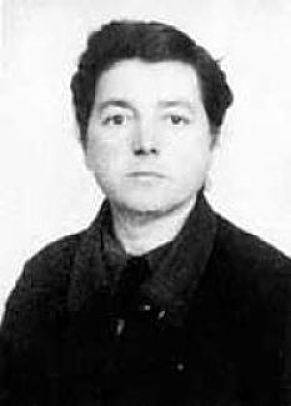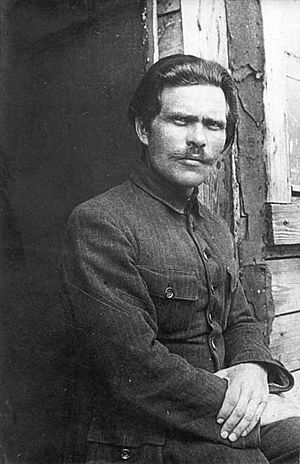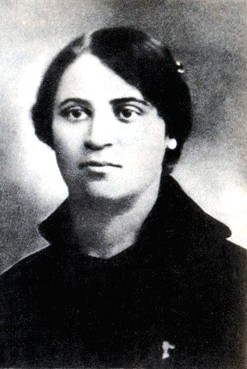Ida Mett facts for kids
Quick facts for kids
Ida Mett
|
|
|---|---|
| אידא מאַט | |
 |
|
| Born |
Ida Markovna Gilman
20 July [O.S. 7 July] 1901 Smarhon, Hrodna, Russian Empire
|
| Died | 27 June 1973 (aged 71) Paris, France
|
| Nationality | Belarusian |
| Other names | Ida Lazarévitch |
| Occupation |
|
| Years active | 1924–1968 |
| Known for | Platformism |
| Movement | Anarcho-syndicalism |
| Spouse(s) | Nicolas Lazarévitch |
| Children | 1 |
Ida Mett (1901–1973) was a Belarusian Jewish doctor and writer. She was also an anarcho-syndicalist. This means she believed in organizing workers to create a society without a government.
After her experiences during the Russian Revolution, she moved to France. There, she worked with other anarchists who had also left Russia. They created a magazine called Delo Truda. They also helped develop a set of ideas called platformism. Later, she was involved in anarchist movements in Belgium, Spain, and France. She spent her later years working as a nurse and writing history books.
Contents
Ida Mett's Story
Her Early Life
Ida Markovna Gilman was born on July 20, 1901. Her family were cloth merchants in Smarhon, a town with many Jewish people. She learned about new ideas from a young age.
After the Russian Revolution, she moved to Moscow, Russia. She studied medicine there. She also became active in the anarchist movement in Russia. In 1924, she was arrested for speaking out against the government. She was then sent away from Russia.
Working on Delo Truda
Ida first went to Poland, then to Paris, France. In Paris, she started using the name "Ida Mett." She helped edit a Russian anarchist magazine called Delo Truda.
Through this magazine, she worked closely with Ukrainian anarchists Peter Arshinov and Nestor Makhno. Together, they wrote an important document. It was called the Organisational Platform of the General Union of Anarchists. This document helped start the anarchist idea known as platformism.
Ida Mett wrote about the meetings where The Platform was discussed. She noted that some French and Chinese anarchists had different ideas. Mett believed that anarchists needed to make their ideas clear to workers. She thought this was important for the workers' movement.
She was impressed by Makhno's speaking skills. For three years, she helped him edit his memoirs. However, they later had a disagreement about the process. In 1928, she left Delo Truda. This happened after she lit a special candle for her father, who had recently passed away.
Life in Hiding
During this time, Ida met Nicolas Lazarévitch, a Belgian who also believed in freedom. They got married. They worked together on campaigns against the Bolshevik government. Because of this, they were asked to leave France and moved to Belgium.
While in Belgium, she met Buenaventura Durruti and Francisco Ascaso. They invited her to Spain after the Second Spanish Republic was formed in 1931. Her son, Marc, was born that same year.
Ida and her husband later returned to France secretly. She worked as a secretary for a gas workers' union. She also wrote for a newspaper called La Revolutión Proletarianne. However, she stopped working with them after they published an article that was unfair to Jewish people.
In 1940, during World War II, the French government held Ida and her young son in a camp. They were there for a year. A friend helped them get released. They then reunited with her husband and moved to La Garde-Freinet in southern France.
After the war, Ida Mett worked as a translator. She also became a nurse at a Jewish children's hospital. She had studied to be a doctor, but her qualifications were not recognized in France. So, she could not work as a doctor there.
Writing About History

As the Cold War began, Ida Mett wrote several history books about the Soviet Union. These included:
- A book about the Kronstadt rebellion.
- A study of Russian farmers before and after the revolution.
- A look at how communism changed after the death of Joseph Stalin.
- A history of the Soviet education system.
She also wrote about the Soviet healthcare system. In this book, she discussed how unfair treatment towards Jewish people grew in the Soviet Union.
Ida Mett's writings were important for people studying Nestor Makhno. She shared her memories of him. She described him as sometimes doubtful of his friends. She also noted that he could be jealous. However, she also said his desire to help society was "sincere and above question." She praised his political skills.
In her letters, Mett said that Makhno was not unfair to Jewish people. She thought some negative stories about him came from political disagreements. Mett also had some critical views about Makhno's widow, Halyna Kuzmenko, in her memoirs.
Her Later Years
Ida Mett and her husband took part in the events of May 68 in France. They shared their experiences with younger generations. Ida Mett passed away in Paris on June 27, 1973. She was 71 years old.
 | Mary Eliza Mahoney |
 | Susie King Taylor |
 | Ida Gray |
 | Eliza Ann Grier |


